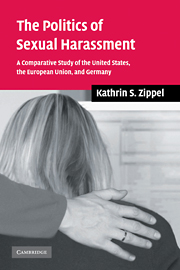 The Politics of Sexual Harassment
The Politics of Sexual Harassment Book contents
- Frontmatter
- Contents
- List of tables
- Preface
- List of abbreviations
- 1 Sexual harassment and gender equality
- 2 Equality through litigation: sexual harassment in the United States
- 3 Diffusion through supranational actors: sexual harassment in the European Union
- 4 The political path of adoption: feminists and the German state
- 5 “Good behavior versus mobbing”: employer practices in Germany and the United States
- 6 Social movements, institutions, and the politics of sexual harassment
- Appendix A List of cited interviews
- Appendix B Data collection
- References
- Index
1 - Sexual harassment and gender equality
Published online by Cambridge University Press: 22 September 2009
- Frontmatter
- Contents
- List of tables
- Preface
- List of abbreviations
- 1 Sexual harassment and gender equality
- 2 Equality through litigation: sexual harassment in the United States
- 3 Diffusion through supranational actors: sexual harassment in the European Union
- 4 The political path of adoption: feminists and the German state
- 5 “Good behavior versus mobbing”: employer practices in Germany and the United States
- 6 Social movements, institutions, and the politics of sexual harassment
- Appendix A List of cited interviews
- Appendix B Data collection
- References
- Index
Summary
Sexual harassment serves as a vivid example of heated struggles over sexuality, power, and gender equality on both sides of the Atlantic because it fuses the issues of violence against women, sexuality, and workplace equality. Several notable, high-profile cases in the United States raised public awareness of the problem of unwanted sexual attention in workplaces and brought the term “sexual harassment” into living rooms throughout the world during the 1990s.
Although Europeans were often skeptical about the relevance of the issue to their lives, surveys report that about the same percentage of women in the European Union (EU) member states and in the United States have experienced sexual harassment at work. There have been several notorious scandals involving European men accused of harassment. The British Crown has been in the news twice regarding allegations of sexual harassment among the staff. Most recently, Elaine Day, forty-five years old, a former personal assistant who worked for Prince Charles's household for four years, resigned and filed a sexual harassment and unfair dismissal suit, testifying that her dismissal was a retaliation for her complaint of “inappropriate touching” by the Prince's assistant private secretary Paul Kefford. She said that she felt threatened by Kefford and that he had sexually harassed two other staff members (al Yafai 2004).
An American woman who had worked for many years on the staff of the United Nations High Commission for Refugees filed a sexual harassment complaint against the High Commissioner, Ruud Lubbers, in 2004, alleging that he groped her after a meeting in his office.
- Type
- Chapter
- Information
- The Politics of Sexual HarassmentA Comparative Study of the United States, the European Union, and Germany, pp. 1 - 41Publisher: Cambridge University PressPrint publication year: 2006
- 2
- Cited by


